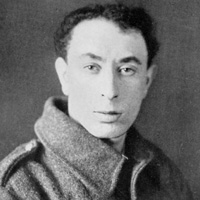Break of the Day in the Trenches by Isaac Rosenberg: Summary and Analysis
In the title of the poem, time juxtaposes with setting in order to create a painful discernment of life and death. In this short free-verse poem of twenty-six lines, the bewilderment of an ordinary soldier confronting the harshness of existence in the trenches during World War I is projected. It is also a contemplation on life in the midst of war.

Isaac Rosenberg (1890 -1918)
In this short poem, Isaac Rosenberg makes a subtle comparison ''between human beings and rats through the medium of the soldier in the trenches. As the soldier was about to build the wall in the trenches, he was touched by the live rat whose cosmopolitan sympathies he appreciates. Cosmopolitan here means the carelessness in terms of nationality. The rat touches the English hand and will even touch the hand of German soldiers. It does not make discrimination between friends and enemies, this and that, mine and yours and many others. It is equal to everyone, but mankind makes discrimination and trenches in various names. Human beings are even inferior to the rats in the sense that they make the discrimination. Human discrimination is a responsible factor behind the war. Human beings are so pervasive and hatred that they even shoot the rat if they knew about its fair attitude. They transfer their mutual hatred for each other onto the rat.
The speaker invites the rat to look at his eyes where the iron, flame and aghast heart dominate. Human eye should be full of love, affection, kindness and benevolence. But unfortunately those human virtues have been replaced by cruelty, hatred, sense of revenge and the desire for mutual destruction. The speaker feels inferior to rat for not being able to maintain the universal sympathies like him.
The concluding quatrain separated by spacing makes commentary on the human nature using the image of the flower poppies. Poppies have the roots in the human veins means to say it symbolically stands for the humanity. The speaker further complains that poppies "whose roots are in man's veins" are dropping day by day. People are the flower standing for humanity. So that humanist flower standing for humanity. So that humanist flower has been gradually dropping flower. But the poem raises hope with the speaker’s claim that his poppy is safe just a little while. Despite being a soldier, he is aware of the human degeneration and this awareness is the source of hope.
With mocking humor, the speaker compares the rat's situation with that of ordinary soldiers, observing that the "Droll" animal is able to survive in the fields of battle. He observes that the trenches and the other demarcations of war that separate the English soldiers from their "enemies" matter little to the rat, which will perhaps cross no-man's-land to continue its feast on German corpses.
On one hand, poppy is the symbol of hope in the poem, but on the next hand, it is the symbol of war, especially its redness stands for the blood of dead soldiers and it grows on the dead bodies of the soldiers in the war field. The ‘dropping’ poppies in the poem suggest the continually dying soldiers in the battle. The whitening of the dust on the poppy signifies the process of the dying of the poppy which metaphorically means the upcoming death of the poetic persona.
This short war poem is recognized as the most admired poems of the First World War by Isaac Rosenberg. The everyday horror of the war and the sentiments of the soldiers are expressed very well without any sentimentality.
